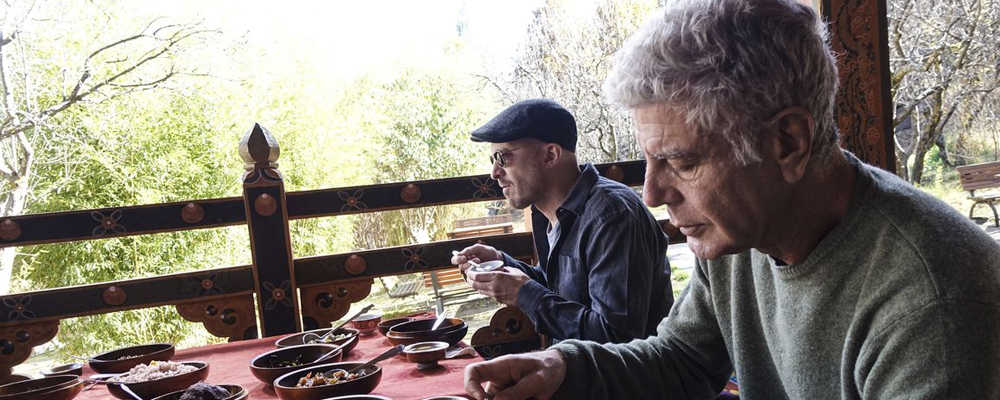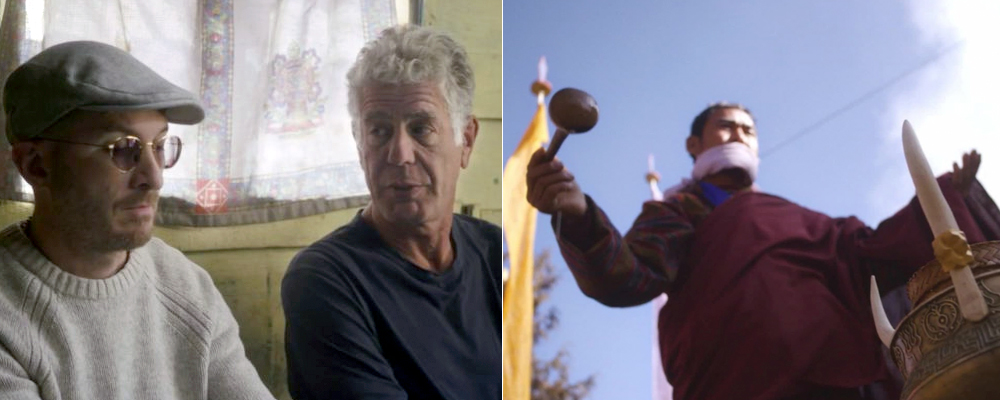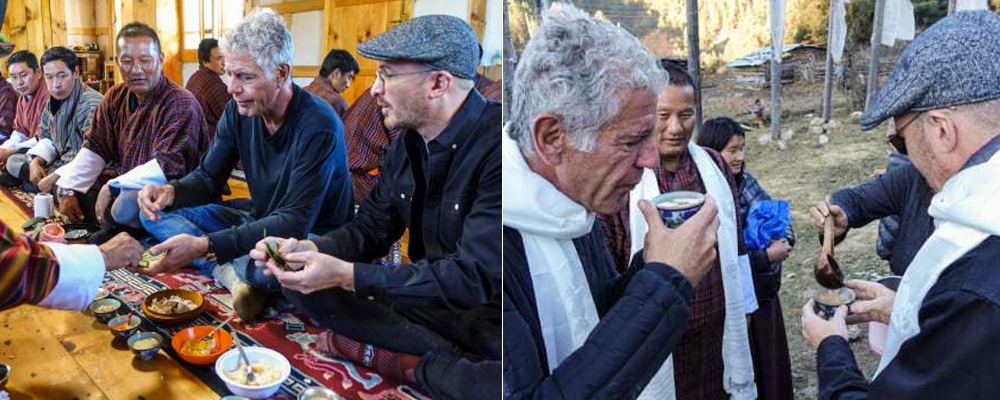Anthony Bourdain and Darren Aronofsky Journey to Bhutan in ‘Parts Unknown’ Season Finale
Alci Rengifo
The passing of an artist can cast a special shadow over their posthumous work. The season eleven finale of “Anthony Bourdain: Parts Unknown” is fun and revelatory, but now has a special sort of melancholia following the sudden death of Bourdain. Footage was reportedly shot for season 12 at the time of Bourdain’s death, and CNN will proceed with using it next season. But as the season finale with the chef turned rebel explorer captures everything that made both Bourdain and his work special.
In the episode Bourdain travels to the Himalayas to Bhutan accompanied by film director Darren Aronofsky. Bourdain was apparently a fan of Aronofsky’s highly divisive “Mother!” and considered it a powerful statement about the ecological crisis. The two journey into the beautiful landscapes of Bhutan and taste the local cuisine (of course), while learning about the local society’s intricate structure and centuries-old traditions. A key underlying theme of the episode is the encroachment of a rapidly high-tech world on a society that is still somewhat hermetic, where the average person makes about $2 a day yet seems happy. The country’s GDP is mostly based on hydro power, because officials are cautious about letting outside forces come in to “develop” the land, even as tourists slowly trickle in in greater numbers. Bourdain himself struggles with the idea of serenity in the high mountains, yet understanding if someone would rather not live their life simply raising yacks.
It is a wonderful irony that this final episode of Bourdain’s last full season of “Parts Unknown” has a meditative quality. Bhutan becomes a stark contrast to western culture. In one scene Bourdain and Aronofsky sit down to chat with environmentalist Benji Dormi, who explains how the government works under a philosophical principle termed Gross National Happiness. When Dormi tries to compare the idea to America’s famous section on the “pursuit of happiness” in the constitution, Bourdain can’t help but smirk a bit and warn Dormi that, “we don’t actually believe that.” Bourdain’s personality was always fueled by a wise sarcasm that never became pessimistic. This was always present in his writing and television work. One memorable moment finds the duo wandering through a village renowned for an obsession with penises for various philosophical, social reasons. Elaborate penile paintings adorn buildings, wooden crafts are strewn on a table. Bourdain confesses he must use all his willpower to avoid making dirty jokes. Other moments have small snippets of insight that now take on a haunting quality. After getting drunk with Aronofsky in the outdoors, Bourdain states that, “It is considered therapeutic to think about death a few times a day.” While discussing vegetarianism with vegetarian Aronofsky, Bourdain tells the director, “Pain is pain. If you don’t respond to that there’s something seriously wrong with you.”
Visually this episode is an immersion into a world of silences and beauty, cheerful living amid grinding poverty and Buddhist faith. The locals practice archery as their traditional sport, with someone always standing by the distant target, laughing and mocking the shooter. There is much alcohol in this episode, as Bourdain and Aronofsky are treated to flavor after flavor of intoxicating elixirs. A mystical air takes over some sections, especially when the two become curious about a forest said to be inhabited by demons. So seriously do the people take such a belief that no roads go through the forest itself, but around it. We dearly wish Bourdain and Aronofsky would venture forth, but they keep their distance. “Parts Unknown” had a tendency to become rowdy in an adventurous, rebel on a journey sort of way. But this episode retains a soothing, calm force. It never gets too wild, as if the restless Bourdain wanted to bask in something more peaceful.
One cannot write about “Parts Unknown” without mentioning more of the food. In all of his shows, Bourdain used food as a gateway to something else, to a bigger picture. In “Parts Unknown” food became the real interpreter between cultures. Bhutan comes alive through its dumplings, yack cheeses and spicy plates. Aronofsky dares to try some meat, only to feel his jaw go numb and sending him to hurl outside a window. Bourdain always found a way to get the famous out of their comfort zones. True, Aronofsky is not Iggy Pop or Barack Obama, but as an established director he is more used to controlling the scene than being its focus. Bourdain makes his friend become a true partner and participant in the journey.
“Parts Unknown” provided viewers with truly unique, cultured television in the purest sense. Maybe it takes a rabble rouser like Bourdain to cross borders with real humanity these days. In an era of high speed technology mingled with a rise in reactionary politics, it is the Anthony Bourdains who become true global citizens. When he shares a sarcastic joke with a Bhutanese monk he is being an equal, in the same fashion he clinked beers with Obama in Hanoi and broke bread with Palestinians in Gaza. This season finale is sad, sad because it is a reminder of what we will be missing in television. Amid all the noise, Bourdain’s journeys into the kitchens of the world provided a bridge, lit by a special lamp whose glow will be missed in these times.
“Anthony Bourdain: Parts Unknown” season eleven finale aired June 24 at 9 p.m. ET on CNN.



